Could Zolotaryov be a saboteur?
Kp.ru special correspondents have studied the archival military documents of the front line soldier Semyon Zolotaryоv
All copyrights belong to Komsomolskaya Pravda. Authors Nikolay Varsegov и Natalya Varsegova
Text in Russain
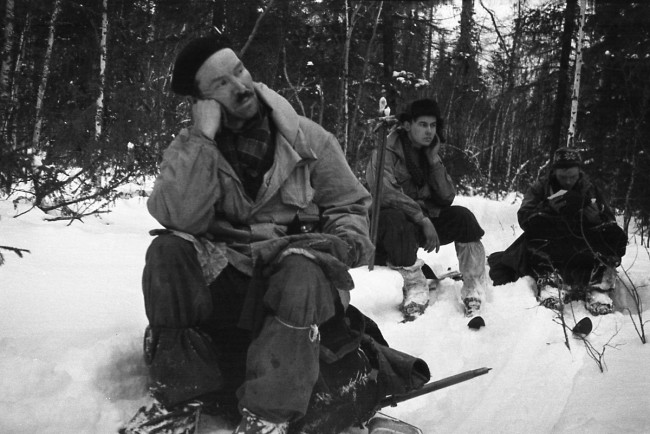
Semyon Zolotaryov. Experienced hiker, instructor of the Kourovka tourbase. Front line soldier. His personality is controversial. His biography is not all clear.
In the winter of 1959, nine ski hikers went missing in the mountains of the Northern Urals. Leader of the group was Igor Dyatlov. A month later rescuers found their tent cut open. Within a mile were discovered five frozen bodies. The rest were found only in May. The hikers died in a strange barely clad state. Some had fatal injuries. It is still not clear why the group fled into the severe frost and to their death.
Among the dead is 37-year-old Semyon Zolotaryov. Experienced hiker, instructor of the Kourovka tour base. Front line soldier. According to some reports, he went to Otorten with the Dyatlov group to be eligible for the third category in sports tourism. According to other testimonies, this journey should have been a significant event for him. “The whole world will start talking about this expedition,” he said before leaving for the mountains to his students. The words were prophetic.
More than 60 years later, no one knows the truth about the mysterious death of the hikers. And the very personality of Semyon is very controversial. His biography is not all clear.
He asked to be call Aleksander, not Semyon. In the documents he sometimes wrote he was born on February 1, and at other times on February 2, 1921. According to the registry of Udobnoy, his native village, his birthday is March 1. In addition, there were discrepancies in the number of siblings he had. In one questionnaire he stated that he had only two sisters, in the other - a sister and a brother. Although, in fact, the family of paramedic Aleksey Zolotaryov had 5 children - Nikolay, Anna, Katerina, Maria and the youngest Semyon. And during admission to the party in 1949, he impudently lied about military awards, saying that he had the Order of the Red Star and the medal For Courage. But in his service record, in addition to the order, there were medals "For the Defense of Stalingrad", "For the capture of Konigsberg" and "For the victory over Germany". But "For Courage" is not on the list.
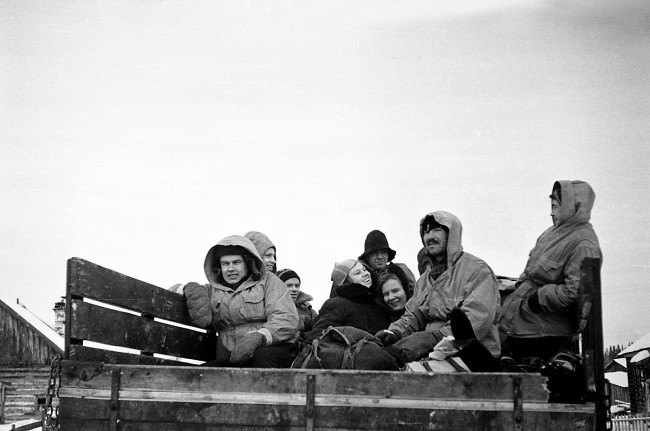
In the winter of 1959, nine ski hikers went missing in the mountains of the Northern Urals. Leader of the group was Igor Dyatlov.
There is an opinion that the military biography of Semyon has many holes. We decided to check that biography against the archival documents of the Ministry of Defense. here are the results.
Personal data
The beginning of the combat path of Semyon Alekseevich Zolotaryоv is described in the autobiography of his personal file in 1944 as a candidate for the CPSU (b), which we managed to find in the archives of the Ministry of Defense. According to the custodian of the fund, since 1944 we are the only ones who requested these documents.
Semyon wrote in neat calligraphic handwriting: “In 1941, on October 18, the Udobnenskiy military registration and enlistment office was mobilized into the Red Army. When I arrived at the unit, I was sent to study at the school for junior commanders. I studied at the school for two months. There I was awarded the rank of "junior sergeant" and sent to the unit as a squad leader. With this unit, I participated in strengthening the defense of Rostov from February to March 1942...".
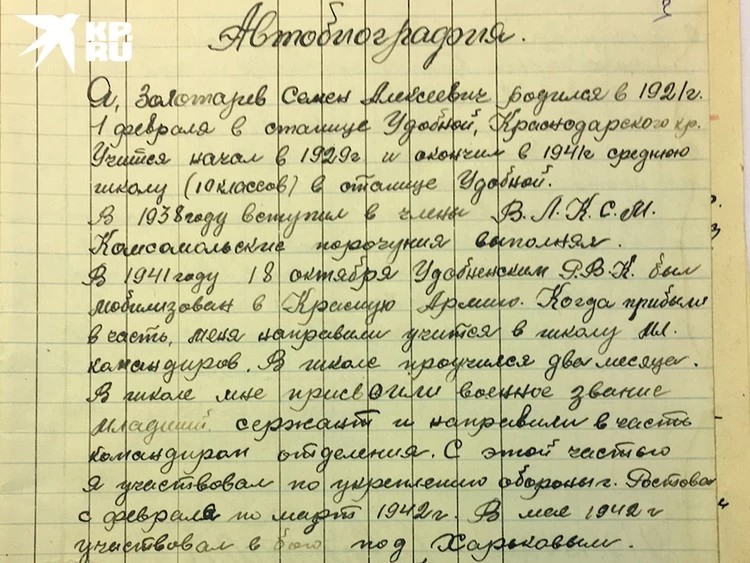
March 1942 Make a note of this date.
Then Zolotaryov writes: “In May 1942 I participated in the battle near Kharkov. (In this battle, according to the recollections of junior sergeant Avetikyan, almost the entire battalion was killed. 20 people out of 450 survived. Zolotaryov, as you know, went through the whole war without injuries, - Author). From July to December 1942 he took part in the defense of Stalingrad. On July 2, 1943 he arrived at the 104th battalion."
In the registration party form for Semyon Zolotaryov we read the following information:
– From October 1941 to August 1942 he served as a squad commander on the Southwestern and Don fronts in the 1570 separate sapper battalion (hereinafter referred to as 1570 SSB).
– From December 1942 to July 1943 - 11th Mobile Floating Assault brigade(hereinafter referred to as 11 MFAB).
– From July 1943 to April 1945 - 104th Separate Pontoon Bridge battalion (hereinafter referred to as 104 SPBB).
– From April 1945 to May 1945 - 13th Pontoon Engineering Regiment.
– From May 1945 to April 1946 - a cadet of the Moscow Military Engineering School.
– From April 1946 to August 1946 he was a cadet at the Zhdanov Leningrad Military Engineering School.
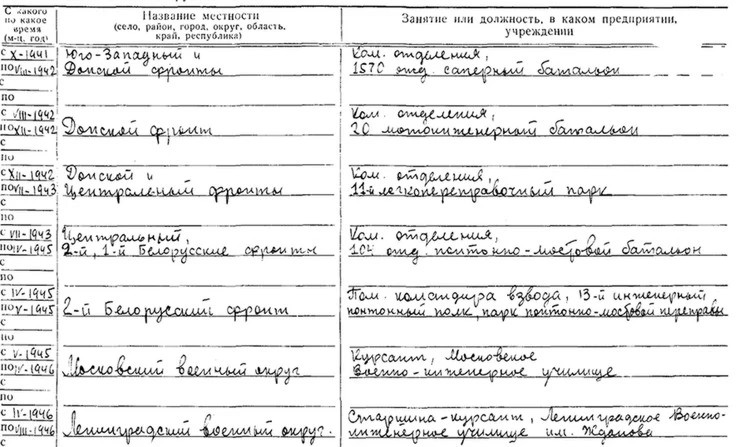
Next, we will present extracts from documents on military units in which Zolotaryov fought, according to his testimony.
1570 SSB
The order for the formation of this battalion was given on November 3, 1941 by the commander of the 24th sapper brigade, Colonel Bazhenov:
"The sapper battalions of the brigade shall be assigned numbers 1562-1580 in accordance with the order of the North Caucasus Military District №00421 dated October 21, 1941."
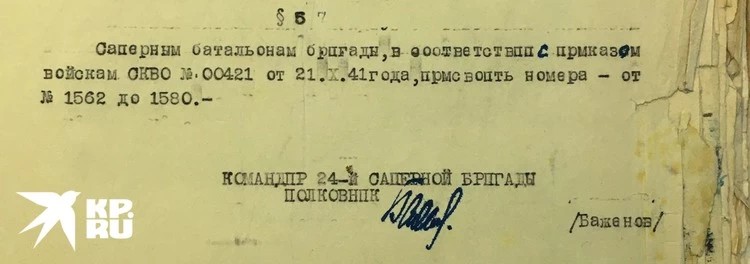
On 5 November, interim battalion commanders are appointed. 1570 OSB is headed by political instructor V.A.Stateikin, and political instructor Y.M. Kurt becomes the military commissar. On December 2, by order of the brigade commander, Stateikin was replaced by captain M.V. Zaitsev.
On November 30, 1941, the staff of the 24th sapper brigade, according to the summary combat note, was 9122 people. Each battalion has approximately 450 soldiers.
The list of the battalions at that time was not preserved. There is only a list of the brigade headquarters. Therefore, it is impossible to reliably either assert or deny that Semyon served in 1570 OSB.
The training battalion did exist then. This is confirmed by an order dated December 1, 1941:
"On 30.11.41, cadet Semisenko was killed by cadet Zhurakovskiy by a rifle shot as a result of careless handling of weapons by the daytime training battalion, and cadet Nikolaev was seriously wounded. The cadets Oleynikov and Zhurakovskiy appointed to the outfit, instead of clearly fulfilling their duties at the post, allowed themselves, in their own words, to "play" with the rifle, doing various kinds of techniques and moving the safety platoon. The case should be transferred to the investigating authorities in order to bring the perpetrators to justice."
On January 22, 1942, another incident occurred in the 24th engineer brigade, which is shocking even now. Around 1 am a fire broke out in the barracks of the 1562 battalion. 134 people died. An excerpt from the order of the brigade commander: "This outrageous case was the result of criminal negligence on the part of the battalion command, which was absolutely ignorant of the fire safety issues. This is evidenced by the panic and confusion that took place during the fire. The preliminary investigation established that the battalion command, knew that the building was very hazardous in terms of fire, but did not take any fire-fighting measures. There were no barrels of water, buckets, boxes of sand in the room. The attendants on duty were not instructed on these issues."
The battalion command was sent to court.
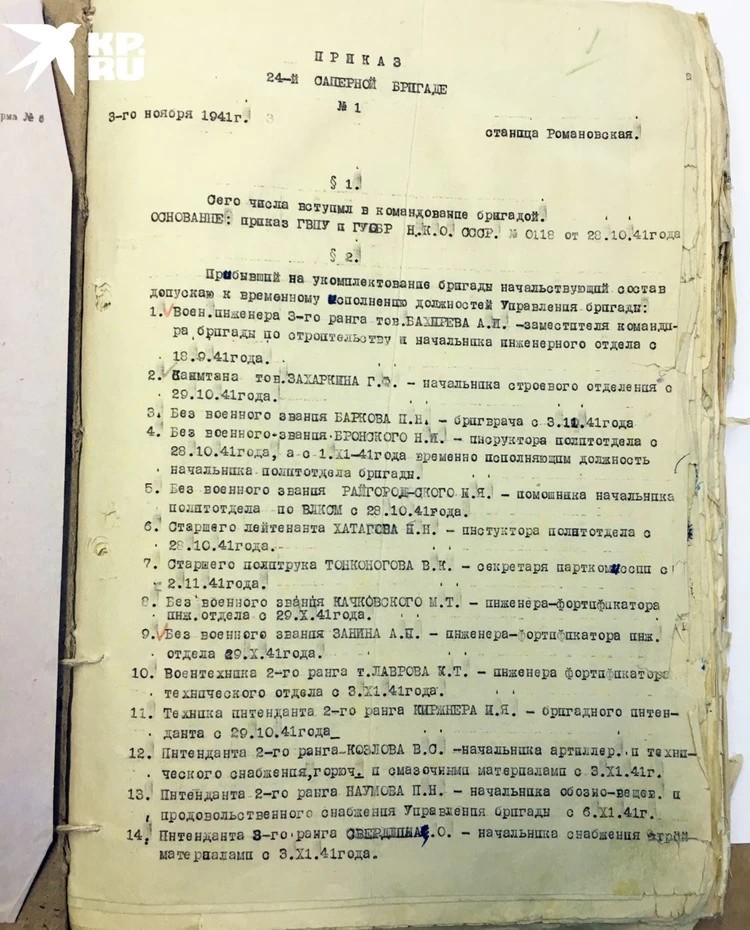
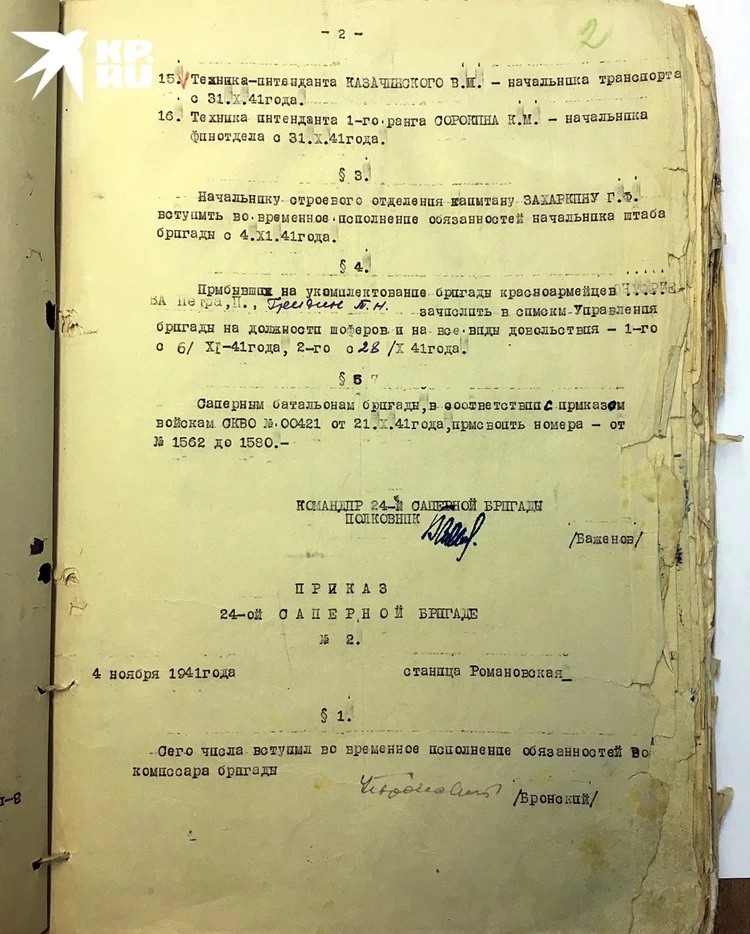
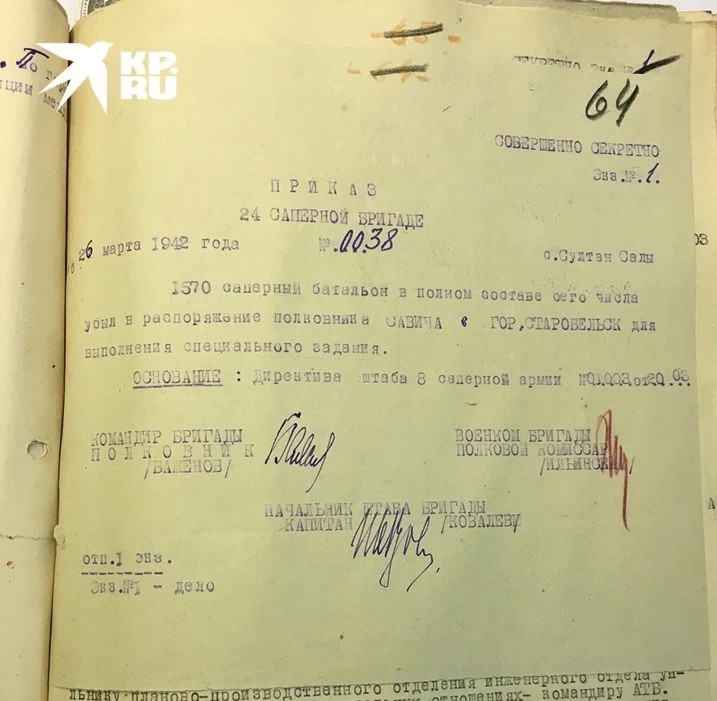
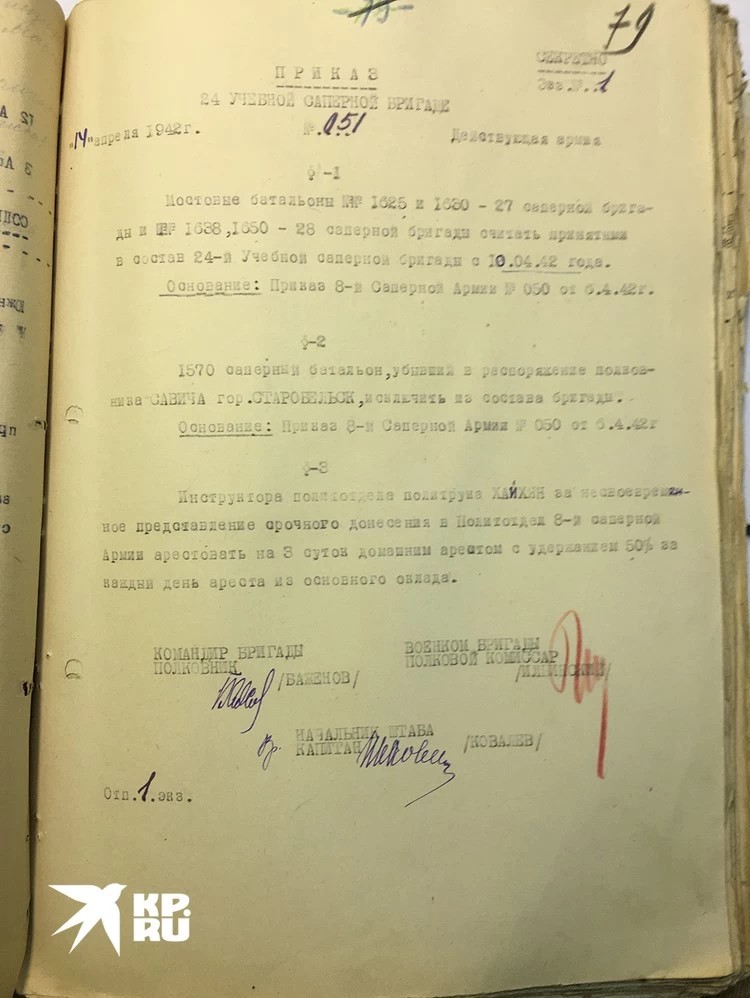
20 MЕB
From the combat log: "On January 1, 1942, the 1570 battalion was transferred as part of the 64th brigade to the area of the 56th Army near Rostov in the Sala region, where it began to set up battery areas and an anti-tank ditch. On March 25, the battalion, which has the best performance in its work, is assigned to a separate sapper battalion of the 28th Reserve Army and is deployed in Starobelsk (80 km or 50 miles north of Luhansk - Author)."

Order dated March 26, 1942:
"From this date the 1570 sapper battalion will be entirely at the disposal of Colonel Savich in Starobelsk to carry out a special assignment. Reason: directive of the headquarters of the 8th sapper army №01003 of March 20."
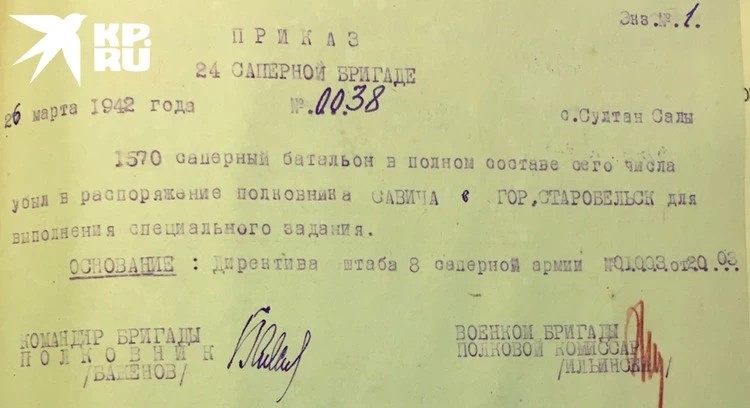
On April 14, 1942, the battalion was excluded from the 24th sapper brigade.
From the political reports of the neighboring 12th Engineering Battalion, it is known that Colonel Savich is the deputy commander of the engineering troops of the 4th Panzer Army. And about the battalion's special mission is written in the battalion's combat log:
"On April 10, the battalion was building a bridge across the Burluk River (near Kharkov, - Author) for the tanks. From 12 to 25 April it was conducting training of personnel. April 26-28 it was building a bridge across the Severny Donets River near the village of Hotnya. From May 5 to June 10, it served 6 bridges on the Severny Donets River in the Pisarevka area. In addition, the battalion carried out its own engineering structures, the construction of barbed wire and mining of fields."
But on June 10, the Germans break through our defenses. The battalion command decides to block the enemy's path and hold the crossings until the rifle sub units approach. For more than a day, sappers held back the enemy's onslaught, losing 30 people killed. And at this moment and further, the battalion withdrew last, covering the retreat of the Soviet troops.

Often, instead of bread, fighters are given flour and dry rations, the cavalry вас not provided with fodder, which led to the depletion of the latter." In such difficult, to put it mildly, conditions, our fighters performed real feats.
In Semyon's party application form, we recall that from August 1942 to December 1942 he served in the 20th motor-engineering battalion. In fact, the 20th МЕB was formed on September 1, 1942. Perhaps the discrepancy in one month is not important, given that it was wartime, but there is a more serious disparity.
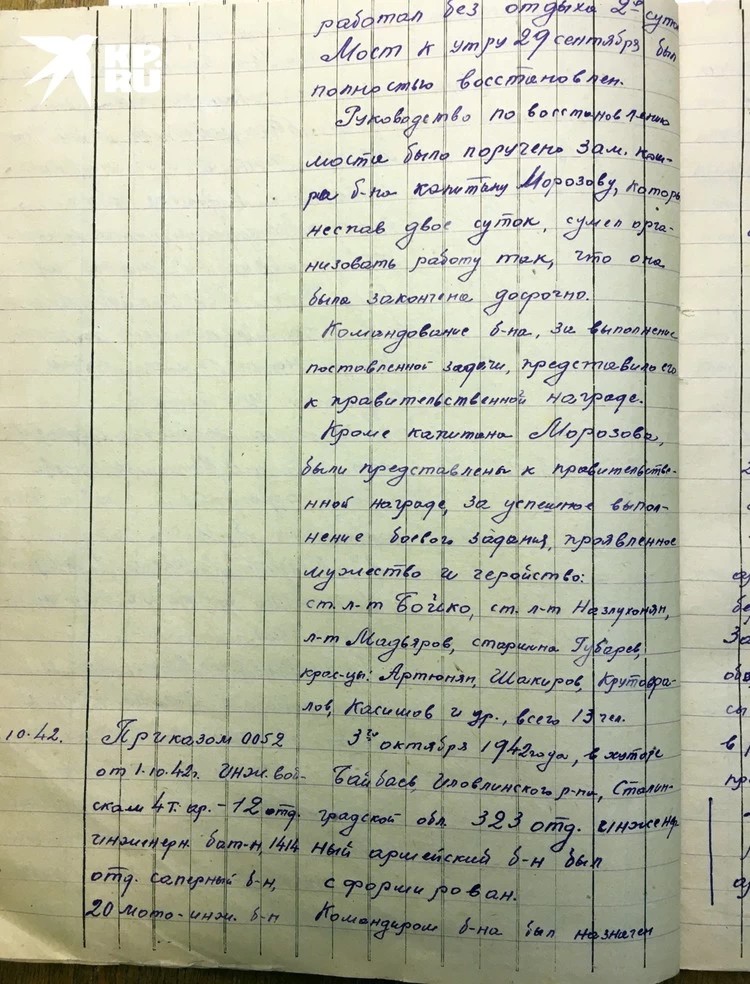
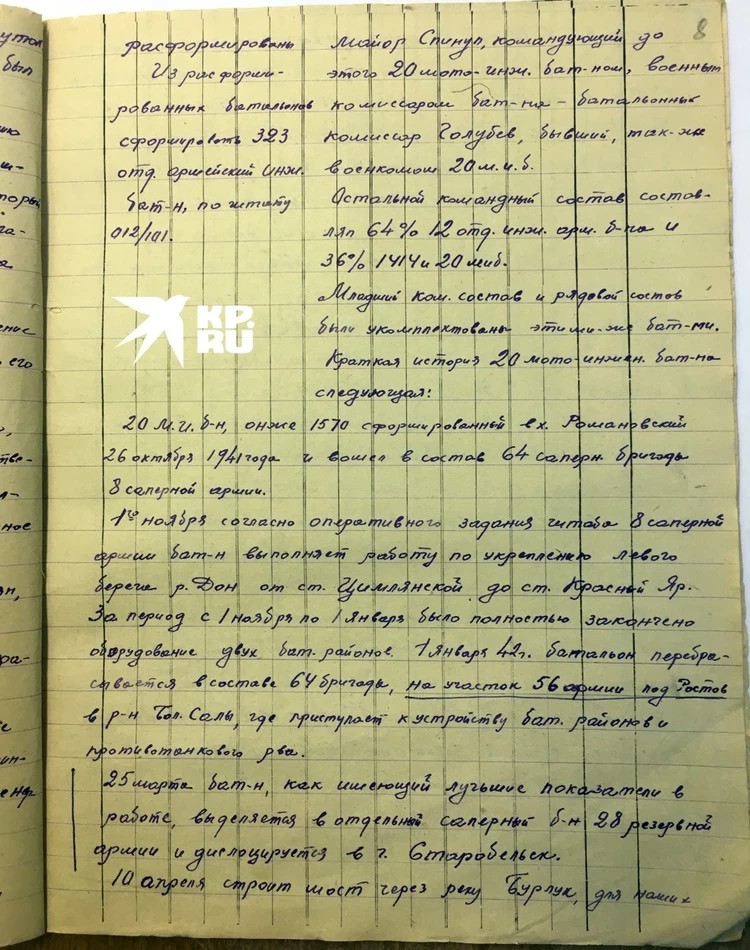
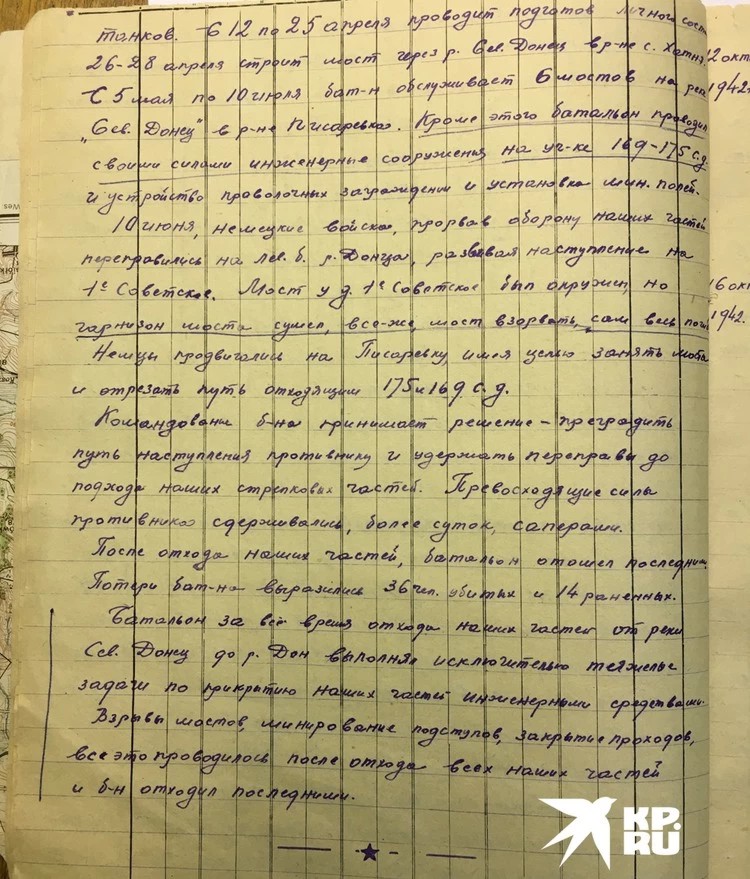
11 MFAB
Zolotaryov wrote that he served in the 20th battalion until December 1942. However, the combat log contains an order to disband this battalion as early as October 1, 1942:
"By order 0052 dated October 1, 1942, the 12th separate engineer battalion, the 1414th separate engineer battalion, and the 20th motorcycle-engineering battalion (20 MEB) were disbanded. Form 323 separate army engineering battalions from the disbanded battalions.” The commander of the new battalion was appointed Major Spinul, the commander of the 20 MEB, and the military commissar - the battalion commissar Golubev, who was also the military commissar of the 20 MEB.
Even if Semyon forgot the date of the disbandment of his battalion, it should be indicated in his army book. But the most curious thing is that Major Spinul on October 8 issues a 15-page order on the staff list of the new battalion. And the squad leader Semyon Alekseevich Zolotaryov is not in it.
In his personal file to become member of the All-Union Communist Party of Bolsheviks, Semyon skips the 20th battalion altogether, indicating that since September 1942 he has been serving as a squad leader in the 11 easy-crossing park.

On November 10, 1942, the 11th Mobile Floating Assault brigade is part of the engineering forces of the Don Front.
And on November 20, it is subordinate to the 24th army.
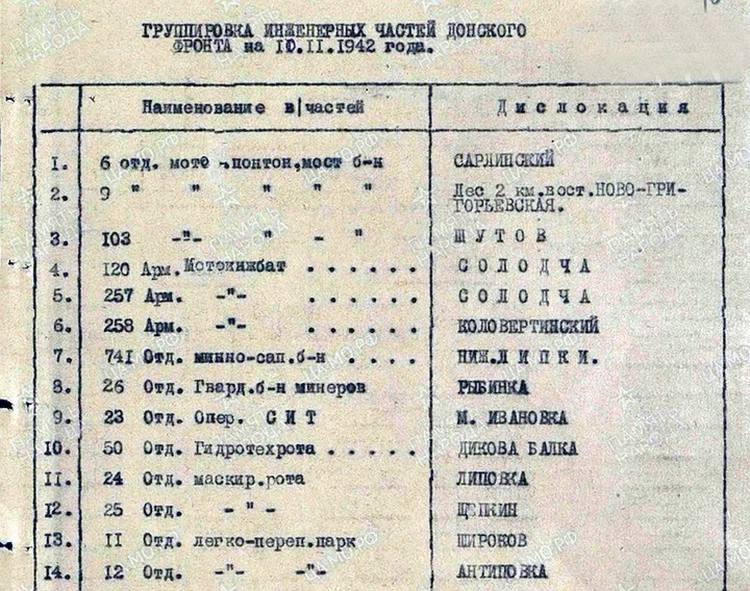
We couldn't find in the archives a single document related to the 11th MFAB, nor in the inventory of the engineering troops of the Don Front, nor in the 24th army, to which the "ghost" of the 11th MFAB was later transferred.
The sapper Semyon Zolotarъоv is assigned to this pontoon battalion from the 11th brigade on July 3, 1943. Тhis coincides with the data from the party application.
Moreover, the 104th battalion is formed from the best fighters of other units. For example, here is an order to the commander of the 50th pontoon-bridge battalion:
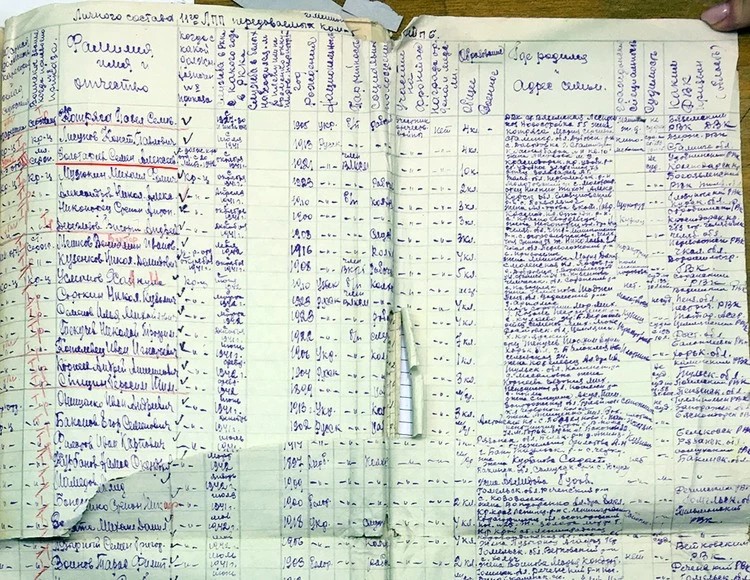
Of the 11 MFAB, the 104th battalion takes the 6 best junior commanders and 33 best Red Army men. Among them (finally!) Is junior sergeant Zolotaryov Semyon Alekseevich.
So, since the beginning of the war, his name was first mentioned in military documents only on July 3, 1943. Around that time, in Kuban liberated from the Nazis, the tribunal tried his older brother, Nikolay, accused of collaborating with the German invaders. And on July 8, 1943, Nikolay was sentenced to death.
Such a strange coincidence.
On August 1, the battalion commander, Major Amelchenkov, asks to approve the list of servicemen who arrived from other units to issue medals "For the Defense of Stalingrad". Major writes to the Chief of Engineering Troops of the Central Front:
"Presenting at the same time a personal list for the replenishment of privates, sergeants and officers who arrived in the battalion from other units, I report that the servicemen named in the list stated that they were participants in the defense of the city of Stalingrad, but they do not have certificates on hand and other documents confirming their participation in the defense of the specified city."
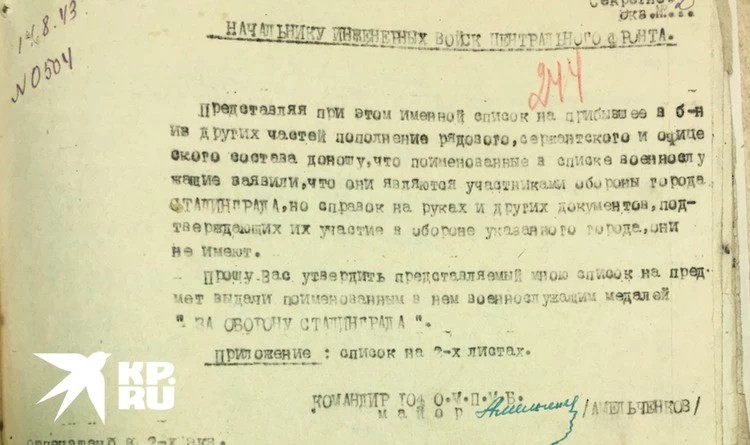
Among the other fighters in the alphabetical list is the pontooner Zolotaryov Semyon Alekseevich, who for some reason, becomes an anti-aircraft gunner and serves in an anti-aircraft machine gun platoon. Chief Lieutenant Colonel Dudanov does not approve the list, demanding from Major Amelchenkov to issue it as expected - with signatures and seals. The major duplicates the document, but this time Zolotaryov is at the very bottom of the list. As if the clerk made a mistake and accidentally missed the fighter's surname, and then caught himself and wrote in. The same situation is in the order of December 31, 1944 on awarding Zolotaryov the rank of senior sergeant. Again, our hero is at the end of the list, and even in a different font. Why is that?
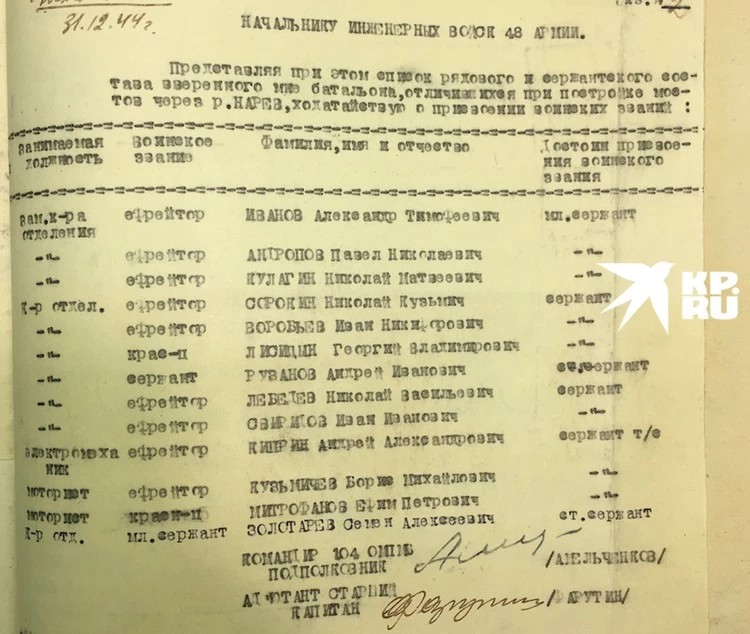
Candidate of All-Union Communist Party of Bolsheviks
In September 1944, Komsomol member Zolotaryov became a candidate for the party. A delicate matter of seven sheets is wrapped in the newspaper "Word of the Fighter". In it Semyon says: "I want to defeat the fascist gang as a communist."
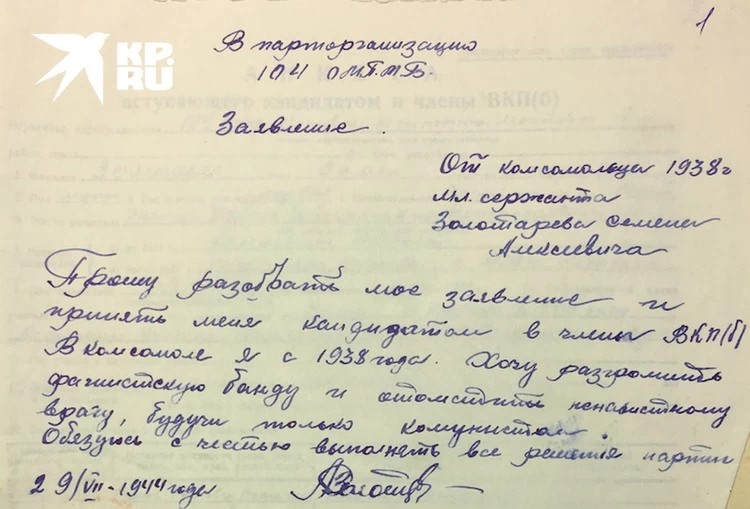
Characteristics of fellow servicemen: "I have known Zolotaryov since July 1943 because we were serving together in the 104th battalion. A disciplined commander, morally stable, demanding of himself and his subordinates." And an autobiography, in which Semyon writes that he was born on February 1, 1921. He has a brother and two sisters. His brother was mobilized into the Red Army, and no one in the family was ever convicted. Of course, in 1944, Zolotaryov might not have known anything about his brother's fate. But how did he managed to forget about the third sister he had is not clear.
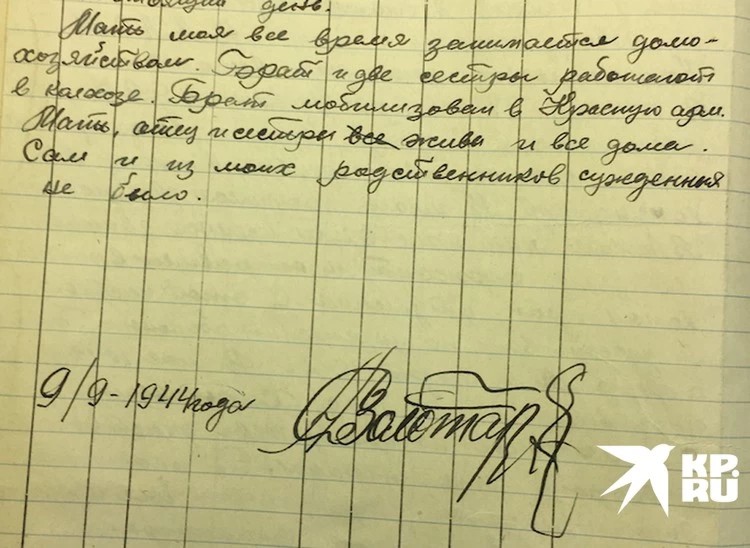
On March 9, 1945, Semyon again becomes a pontooner. He was transferred to the 1st pontoon company of the 104th battalion as a squad leader.
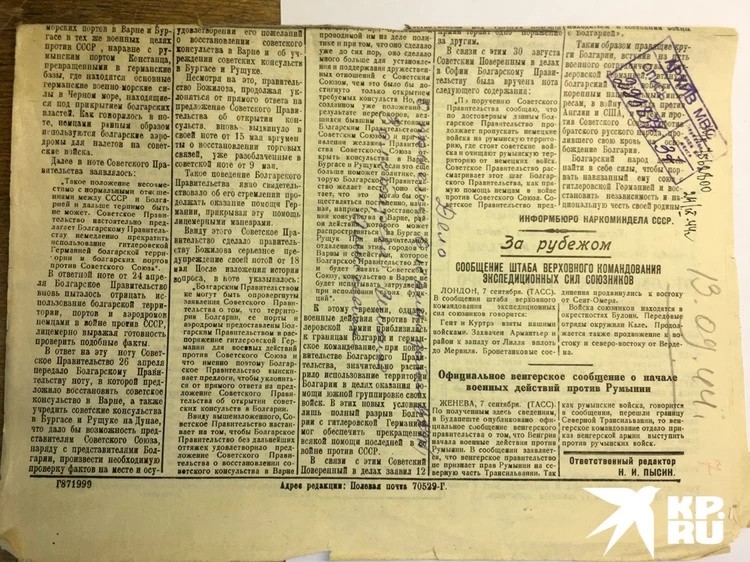
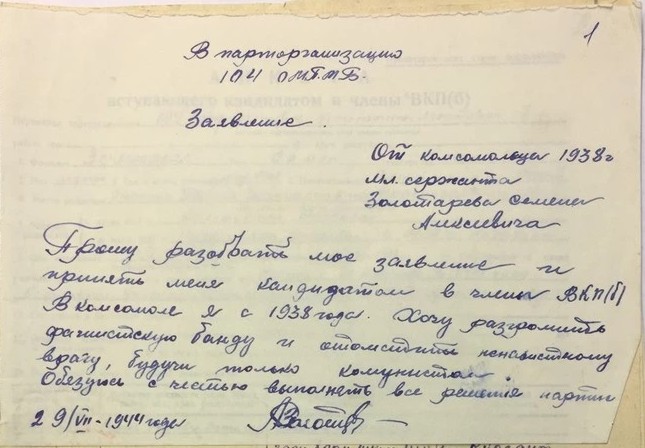
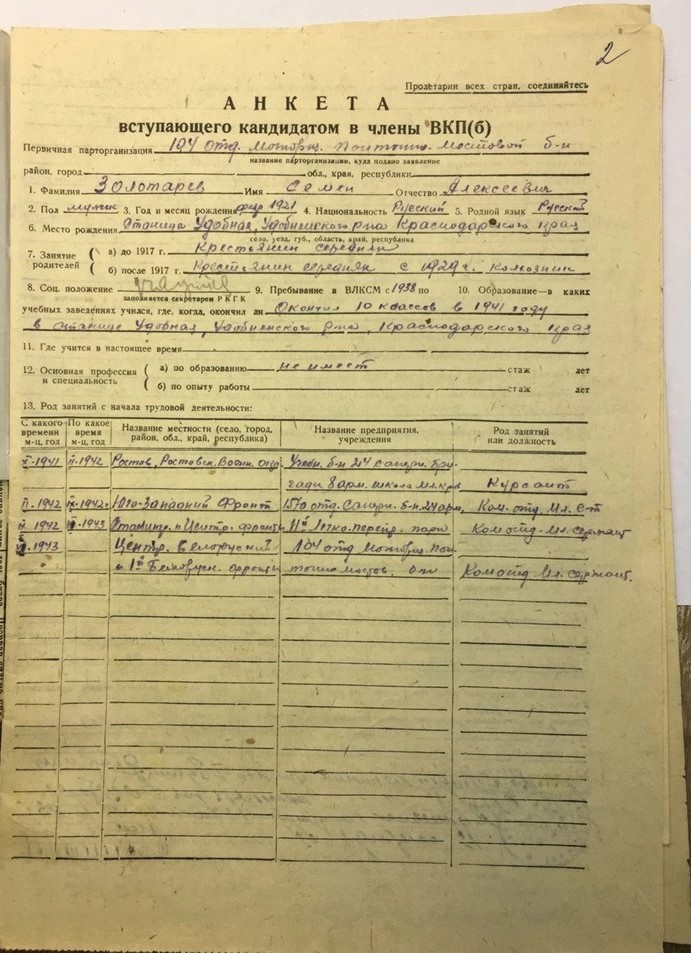
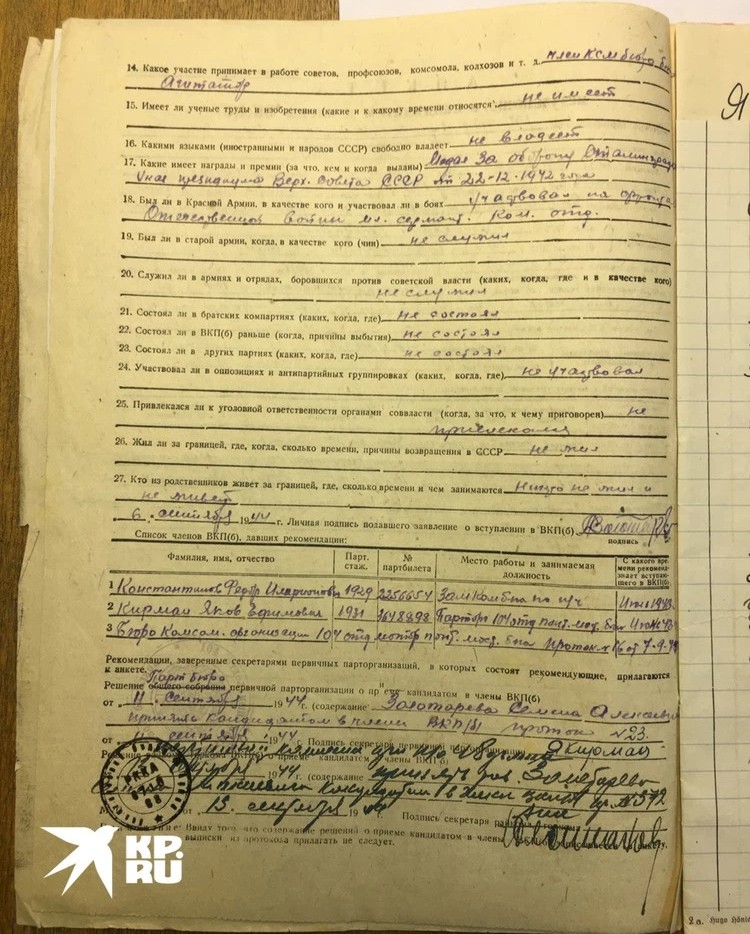
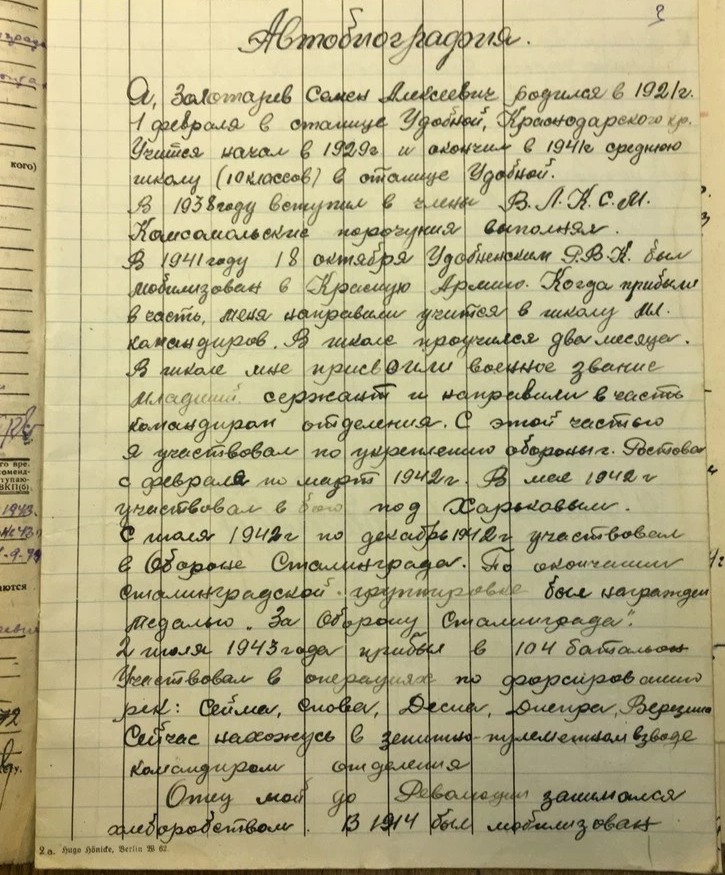
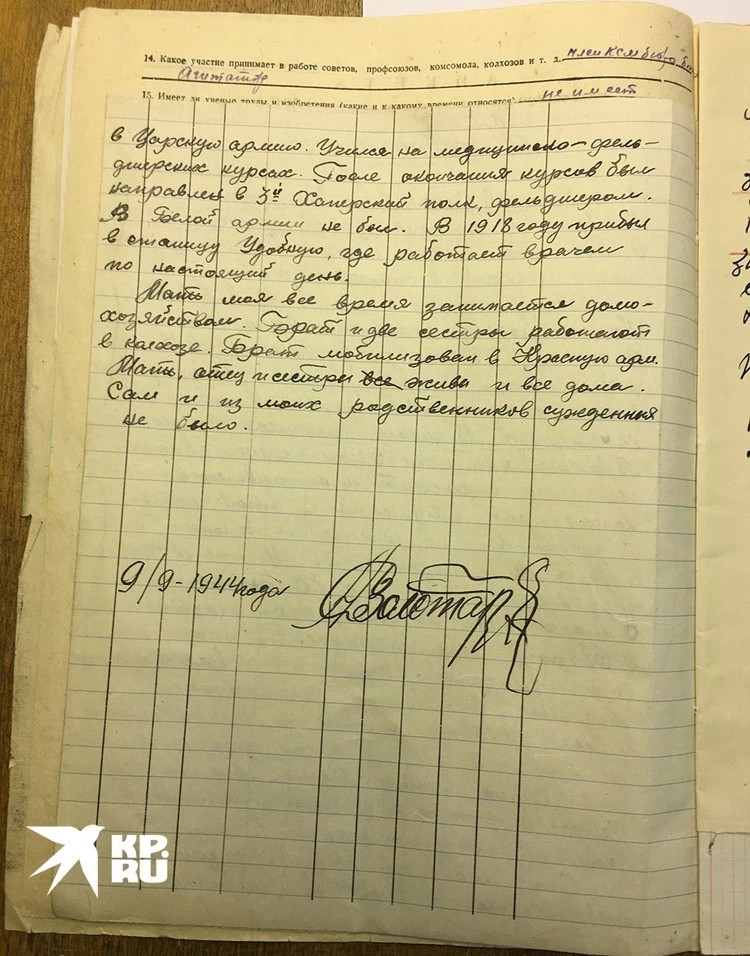

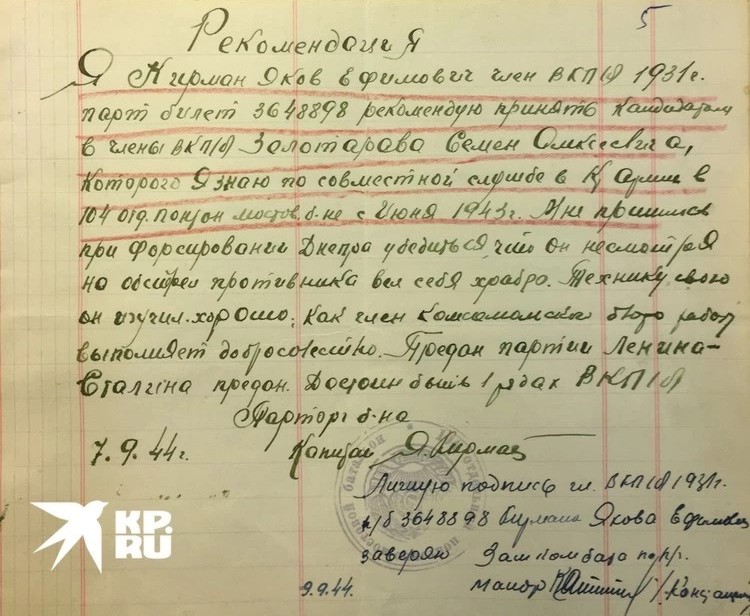
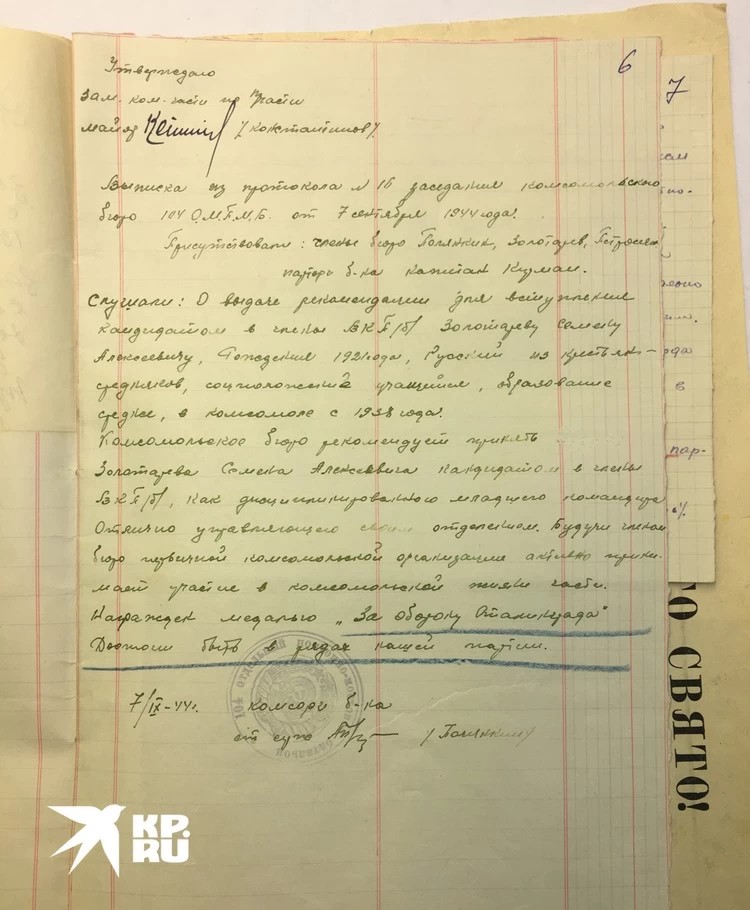
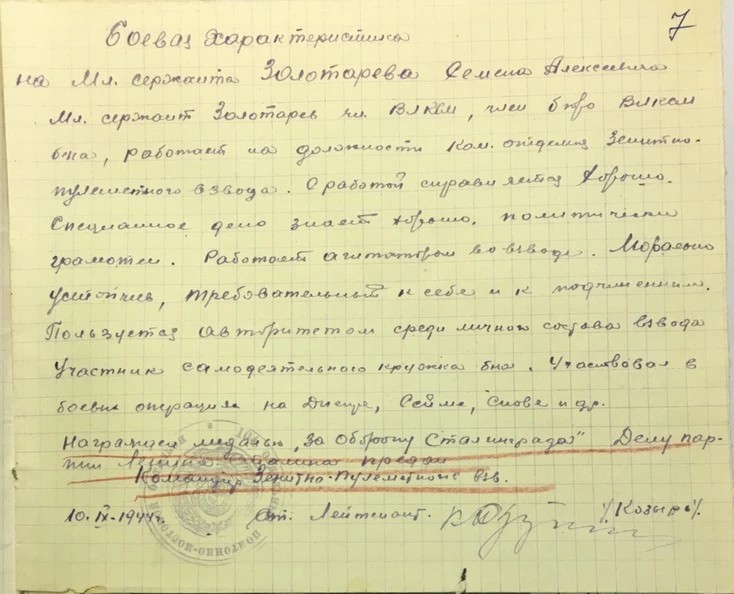
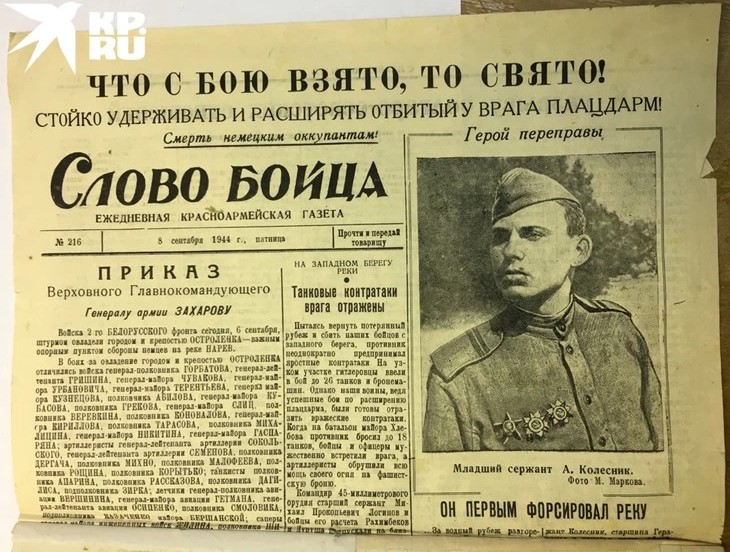
13 engineering pontoon regiment
In April 1945, the 104th battalion was transferred to the regiment. This also coincides with the data of Semyon's party application. In the same month he accomplishes the feat.
"Senior sergeant Zolotaryov, under enemy artillery and mortar fire, transported 9 people on the night of April 21-22, 1945, pontoons with a topside on one 50-ton ferry. Arriving at the place where the ferry was being assembled, Comrade Zolotaryov quickly and skillfully began to assemble the ferry. The enemy began shelling this place with guns, mortars and machine guns. One soldier was wounded, but senior sergeant Zolotaryov did not stop work, but he took the place of the wounded soldier and, with his example of fearlessness, inspired the soldiers to complete the task as soon as possible. The same shell broke two girders and the flooring. In about 300 meters in the swamp lay the platform from the broken ferry, then Zolotaryov got it up to his waist in water. The Red Army soldier Korneev, without orders, went behind senior sergeant Zolotaryov and together drove the girders to the ferry being assembled. The task was completed on time and the ferry was brought into the line of the bridge. For the skillful command of the squad, for the courage and heroism shown, he deserves a government award."
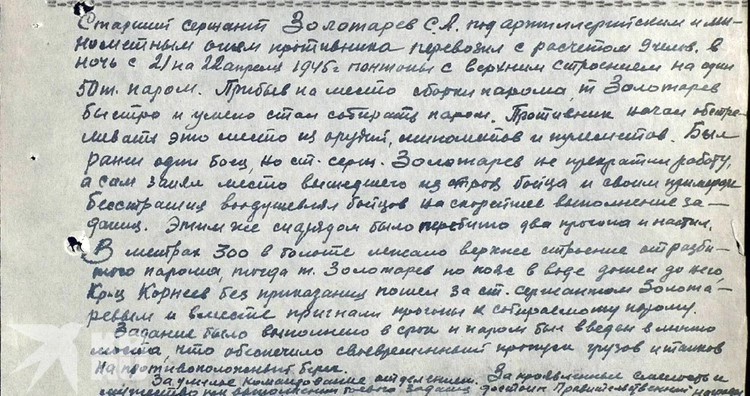
By order of May 15, 1945, senior sergeant Zolotaryov was awarded the Order of the Red Star.
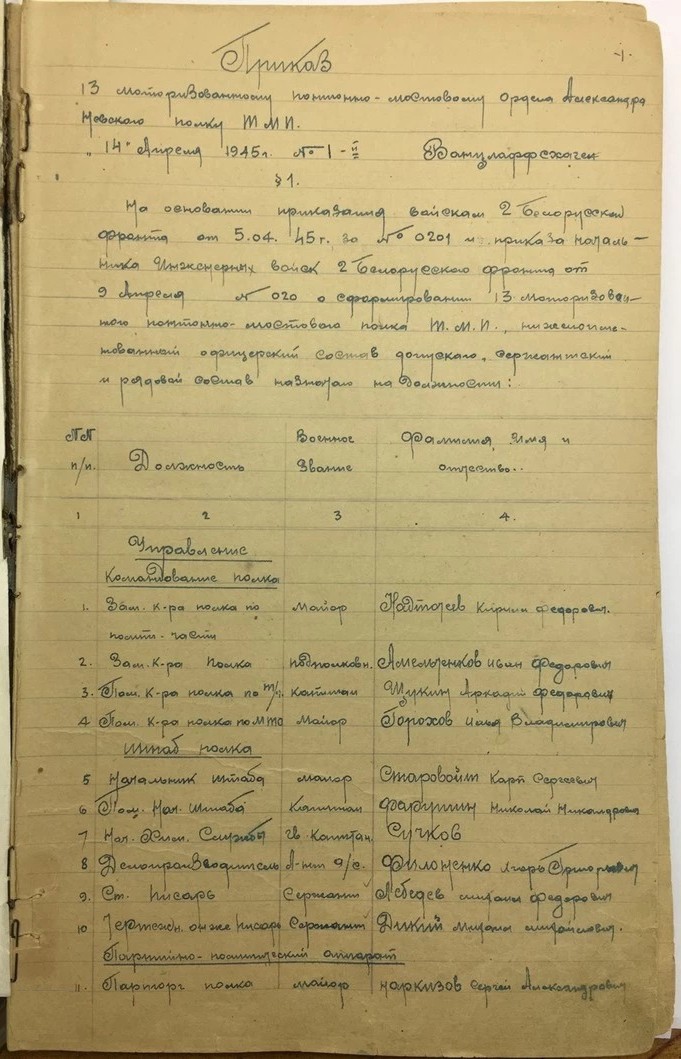
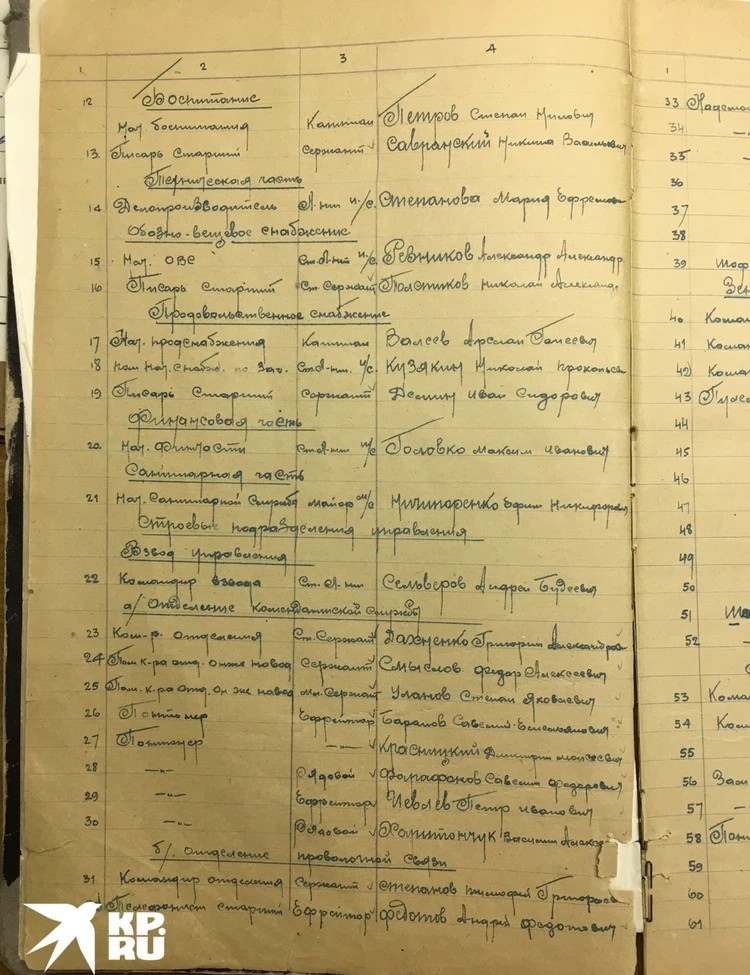
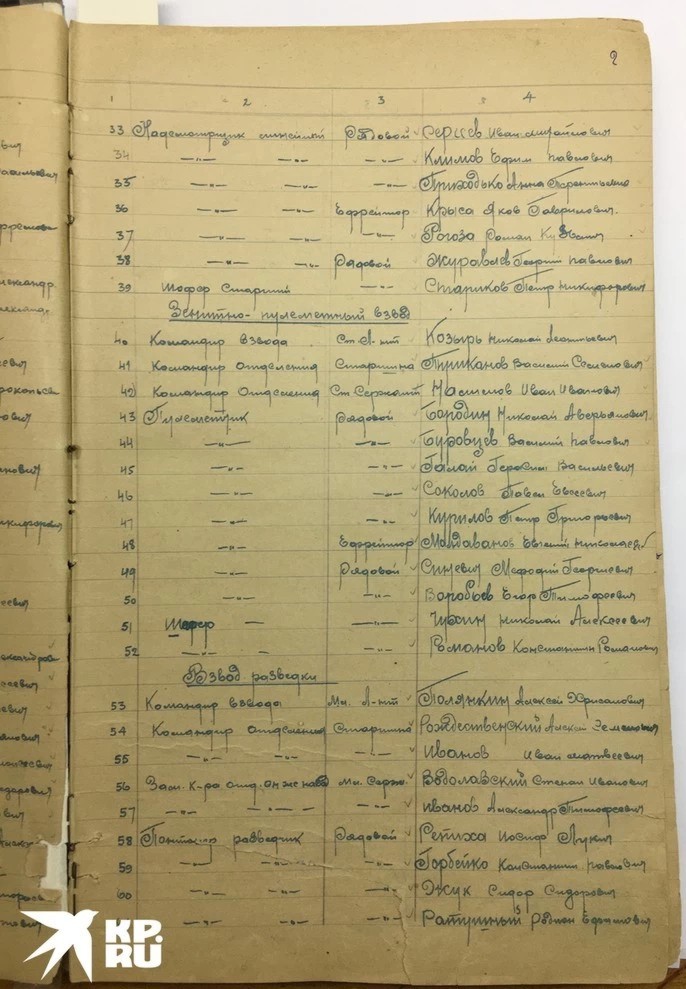
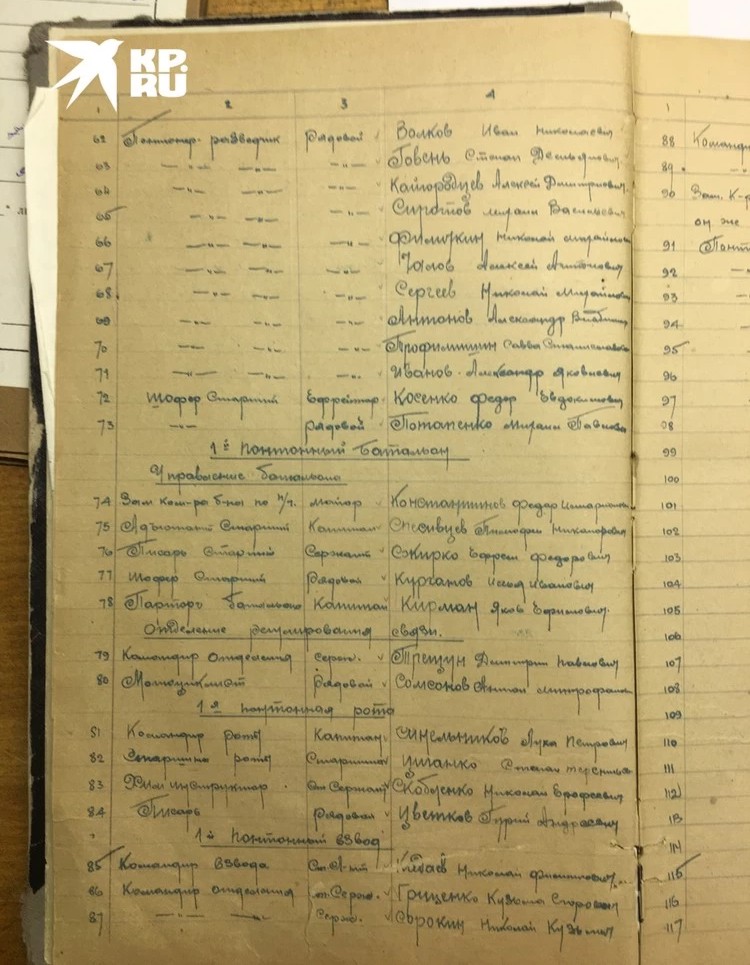
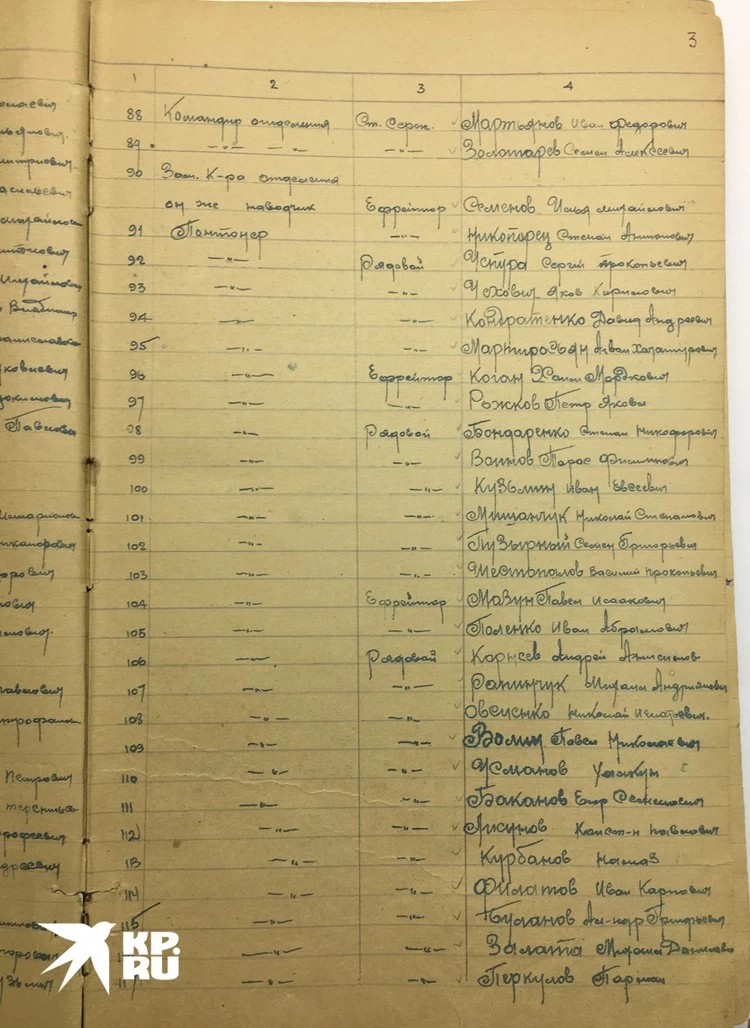
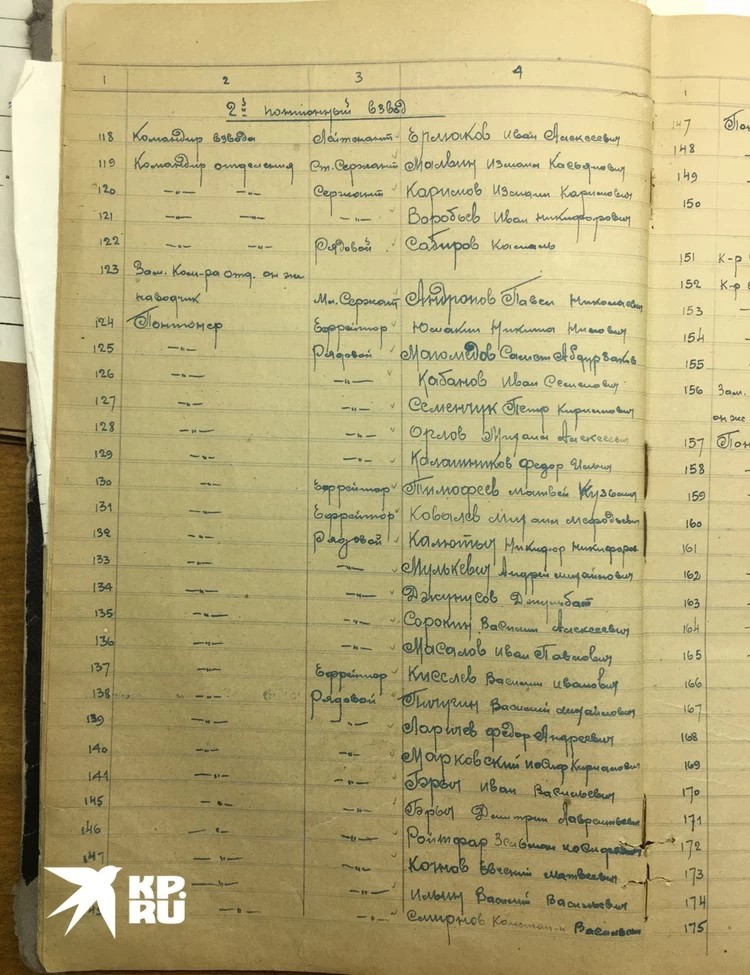
School
Semyon wrote that since May 1945 he has been a cadet at the Moscow Military Engineering School. But according to the data of the school itself, he arrives there on July 6, 1945. Again, it is not clear why Semyon was wrong about the dates.
From the staff files of the 13th engineering pontoon regiment we see that he was sent to study in Moscow only on June 29.
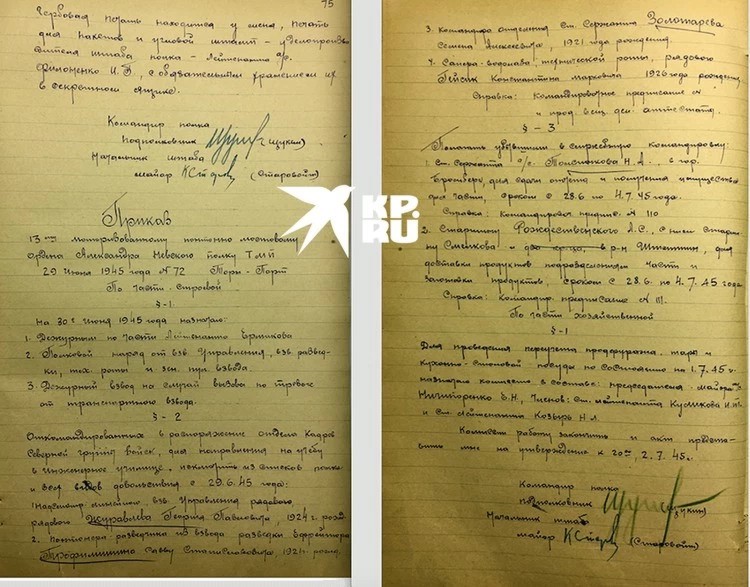
In April 1946, cadet Zolotaryov was transferred to the Leningrad Military Engineering School, from where he was demobilized in August of the same year, having received a pass certificate to the Kuban to the village of Udobnoy. According to the laws of that post-war period, he had to register at the military registration and enlistment office and get a passport in order to live peacefully in civilian life. However, Semyon unexpectedly goes to Minsk and enters the first year of the Institute of Physical Education. However, this is a completely different story.
From the authors
The first thing that catches your eye when analyzing archival documents is the scope of Semyon Zolotaryov's specialties. In the rank of squad leader, he serves as a sapper, pontooner, anti-aircraft gunner, and again as a pontooner. This is a strange career, considering that all the years he was a squad leader and could "keep" a specialization.
Second, Semyon's military autobiography does not coincide with the archival data of a number of units. And this does not exclude the fact that Semyon might not have been there, as if he was absent for a while.
The third is the lists in which Semyon's name does not appear alphabetically. As if they were creating some kind of coverup for him. But why?
There is a theory that in the first years of the war, the 1570 battalion was part of the 8 engineer army, from where the famous scout-saboteur Ilya Starinov recruited fighters. He is also the organizer of the partisan movement. For reference, Ilya Starinov is the deputy chief of staff of the engineering troops of the Red Army. At the end of 1941, he was the head of the operational engineering group on the Southern Front. In the spring of 1942 he was the commander of the 5th separate engineering brigade for special purposes. A little later - the head of the High Operational School of Special Purpose of the Central Headquarters of the Partisan Movement, where scouts-saboteurs were trained.
And here, attention, in the affairs of the 8th engineer army we find an order: "On March 20, 1942, the chief of staff ordered:
23 and 25 Sapper brigades to allocate three vehicles and one soldier for each vehicle at the disposal of Colonel Comrade Starinov. Submit the allocated cars to Rostov-on-Don at the corner of Budennovsky and St. Maxim Gorky by 9 o'clock on March 21, 1942. Cars vehicles must be equipped for the transportation of mines."
We will remind you that Semyon wrote that he was helping the defense of Rostov from February to March. But what if in March 1942 Semyon Zolotaryov ends up with Colonel Starinov and goes through a sabotage school? Hero behind enemy lines until mid-1943? Then for some reason he returns to the pontoon boats. But acquaintance with Starinov ties Zolotaryov to the special services.
This could explain why he never talked about the war, how and where he learned to skillfully throw knives. Indeed, for a pontooner and an anti-aircraft gunner, this is not the most required skill. He is not opressed because of the betrayal of his brother, he is allowed to join the party. They turn a blind eye to all his mischiefs, and when it comes to giving a bribe in the city of Lermontov, he was mildly reproached that if he does not change his ways he might also answer for his brother.
We, as always, are waiting for the reader's thoughts on the forum on this topic.
Expert opinion
Senior Researcher, Research Institute of Military History Vladimir Fesenko:
"I got interested in the Dyatlov Pass at some point of time. Semyon Zolotaryov surprised me with his participation in this expedition. He did not belong by interests, or by age, or by experience with these young hikers. But as far as the documents from archives and personal stories about the Great Patriotic War, there were not such inconsistencies in the biographies of the fighters. The reason for this is the low level of office work. Plus our carelessness.
Therefore, I would not pay much attention to timing mismatches. In the early years of the war, it often happened that battalions were disbanded, and documents about this came from headquarters retroactively.
Zolotaryov's various specialization does not look out of the ordinary for me. He was just the squad leader where he was sent, and served there. Now, if he was an officer, then there would be a reason for discussion.
But the discrepancies in the questionnaires and autobiographies raise questions. On the one hand, he could deviate from his real life in order to embellish himself or make the document convenient for certain purposes. Joining a party, for example. On the other hand, how can you not remember how many brothers and sisters there are in the family? It is also pointless to lie about it.
As for the brother, I agree that he might not have known about his fate. But in 1944, such things were monitored and it was clearly brought to the attention of SMERSH battalion or special department. And then he is calmly accepted as a candidate of the CPSU(b). It's also strange.
But most of all in this story I am confused by the moment with the addition of his last name. It can be seen from the document that it is added later with the same typewriter. And his name stands out clearly. And it is not in just one instance.
For a discussion of the historical background of those years, the material is very interesting. But I would not begin to bring the whole base under the possible participation of Semyon in the sabotage operations of Ilya Starinov. This version, of course, has the right to exist, but with a stretch."